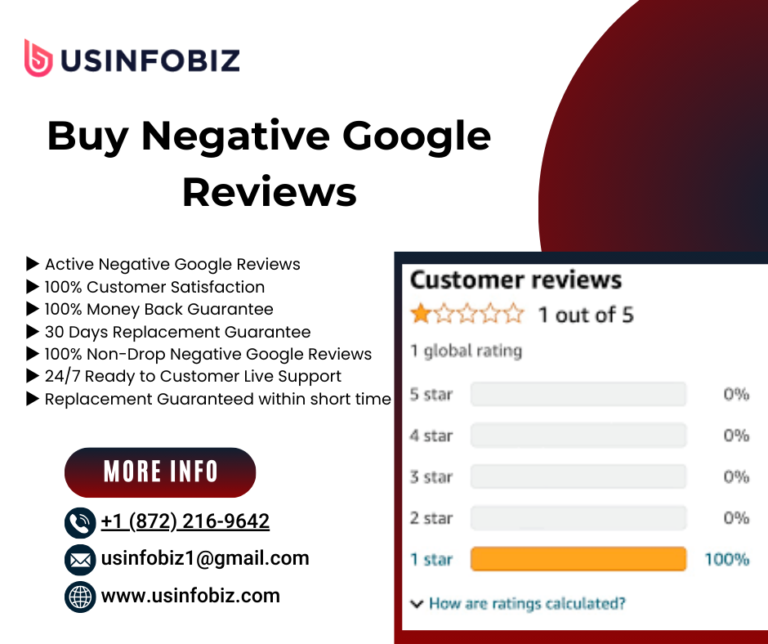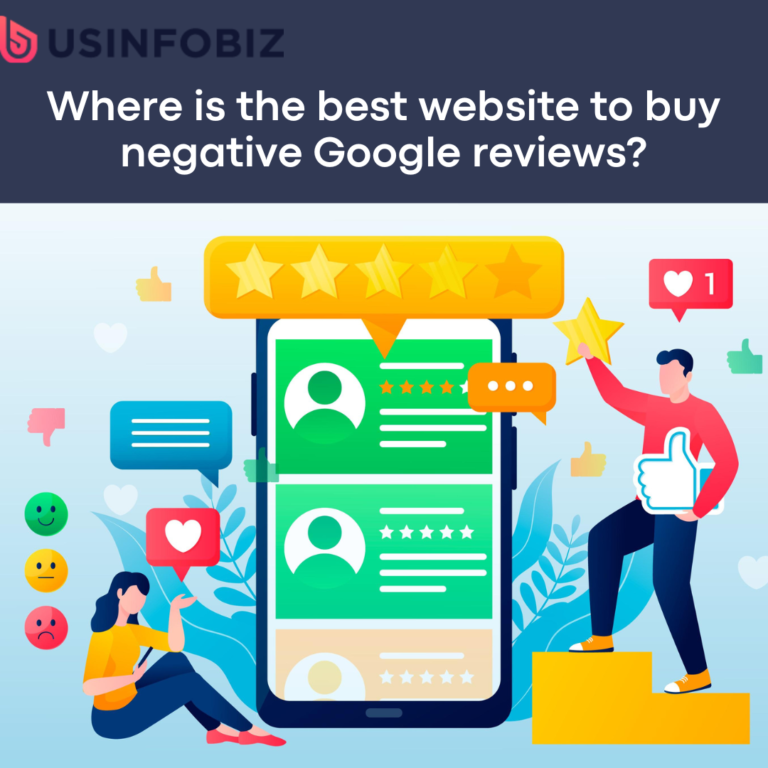Why Customers Trust Google Negative Reviews
In today’s digital landscape, online reviews hold immense power. They can make or break a business in the blink of an eye. Amidst this chaotic environment, some companies explore dubious shortcuts like buying Google negative reviews to manipulate their reputation. But what happens when they take this risky route? Spoiler alert: it often backfires. Negative reviews aren’t just bad for your image; they can seriously derail your business performance and trustworthiness in the eyes of potential customers.
The truth is that consumers are more discerning than ever before. They rely on authentic feedback to make informed decisions about where to spend their hard-earned money. As we dive into the complexities surrounding online reviews, we’ll uncover how purchasing these damaging critiques not only misguides customers but also poses significant risks for businesses themselves. Let’s unpack why customer trust in Google negative reviews matters and how you can navigate this challenging terrain without sacrificing your integrity or reputation.
The Consequences of Buying Google Negative Reviews
Buying Google negative reviews may seem like a quick fix, but the consequences can be severe. Businesses that take this route often face backlash when customers discover the deceit. Once trust is broken, it’s challenging to rebuild. Genuine customer feedback is critical for establishing credibility and loyalty. Fake reviews disrupt this process. Additionally, search engines continuously update their algorithms to detect fraudulent activity. If caught, businesses risk penalties such as removal from listings or reduced visibility in search results.
Financially, companies might invest heavily in purchasing these negative reviews only to watch revenue dwindle as customers flock elsewhere. The long-term damage far outweighs any short-term gain. Moreover, employee morale can suffer when workers realize the company engages in unethical practices. A toxic work environment leads to high turnover rates and diminished productivity—all stemming from decisions driven by desperation rather than integrity.
How to Identify Fake Online Reviews
Spotting fake online reviews is crucial for making informed decisions. Start by analyzing the language used in the review. Generic phrases or overly positive descriptions can be red flags. Next, check the reviewer’s profile. If they have only one review or a suspiciously high number of five-star ratings, it might indicate inauthentic behavior. Genuine reviewers often have varied experiences and balanced feedback.
Look at the timing of reviews as well; multiple reviews posted within a short time frame may suggest coordinated efforts to boost or damage a business’s reputation. Don’t forget to consider emotional triggers in the content. Reviews filled with extreme emotions—either overly ecstatic or outrageously negative—can sometimes hint at manipulation rather than sincere opinions. Cross-reference reviews across different platforms for consistency. Discrepancies can help you discern which ones hold more weight and credibility.
A Local Business That Overcame Negative Reviews and Thrived
Smith’s Café faced a barrage of negative reviews when a disgruntled customer took to Google. Initially, the impact was devastating. Sales plummeted and morale dipped among staff. Instead of panicking, the owner, Emily Smith, saw an opportunity for growth. She actively engaged with every review—both positive and negative. Each response was sincere, showcasing her dedication to customer satisfaction. Emily also revamped her menu based on feedback and introduced loyalty programs that incentivized repeat visits. This not only improved food quality but made customers feel valued.
Within months, Smith’s Café transformed its reputation through transparency and genuine care. Regular patrons started sharing their positive experiences online, gradually overshadowing previous criticisms. The café became a beloved local spot again—a testament to resilience in the face of adversity. Their story inspires other businesses grappling with similar challenges in today’s digital landscape.
The Legal Risks of Purchasing Negative Reviews
Purchasing negative reviews may seem like a quick fix for your competition, but it comes with serious legal risks. Engaging in such deceptive practices can lead to lawsuits and damage claims from affected businesses. Many jurisdictions have strict laws against false advertising and unfair business practices. If caught, the penalties could include hefty fines or injunctions that halt your operations. Moreover, platforms like Google actively monitor for fraudulent activity. They employ algorithms to detect suspicious patterns of review posting.
Getting flagged could result in account suspension or removal from search results altogether. Additionally, negative public sentiment can arise if customers discover you’re involved in unethical tactics. This backlash can further tarnish your reputation and drive away loyal clientele who value transparency and integrity. Protecting your brand should never involve shortcuts that risk everything you’ve built.
Understanding the Impact of Google Reviews on Your Business Reputation
Google reviews serve as a mirror reflecting your business’s reputation. A high rating can attract new customers, while negative feedback can drive them away. Potential clients often turn to Google to gauge the quality of products and services. They trust these reviews more than traditional advertising strategies. A single poor review may not seem impactful, but when accumulated, it tarnishes your brand image significantly. Customers view multiple reviews before making decisions; they seek reassurance in others’ experiences.
Moreover, Google’s algorithm factors in these ratings for local search results. So, a lower average score could hinder visibility online—making it harder for prospective clients to discover you. Managing Google reviews is essential for maintaining credibility and fostering customer loyalty. Your response strategies will shape how current and future clients perceive your commitment to service excellence.
Top Strategies for Addressing and Mitigating Negative Reviews Ethically
Addressing negative reviews requires a thoughtful approach. Start by acknowledging the feedback. Respond promptly and sincerely to show that you value customer opinions. Offer solutions where possible. If a customer mentions a specific issue, explain how you plan to resolve it. This demonstrates accountability and commitment to improvement. Encourage positive interactions with satisfied customers.
Invite them to share their experiences online. A balanced review profile can dilute the impact of negative comments. Monitor your online presence regularly. Use tools that alert you when new reviews appear, allowing for timely responses. Take conversations offline when appropriate. Provide contact information in your reply so concerned customers can discuss issues directly with you rather than publicly airing grievances further online.
A Step-by-Step Guide to Responding to Negative Reviews Effectively
Responding to negative reviews can feel daunting, but a thoughtful approach makes all the difference. Start by acknowledging the reviewer’s concerns. A simple “Thank you for your feedback” shows that you value their opinion. Next, address specific issues mentioned in the review. Being transparent about what went wrong can demonstrate your commitment to quality and service. Apologize sincerely if necessary. A genuine acknowledgment of any mistakes fosters trust and humanizes your business.
Offer solutions or compensation where appropriate. This could be a refund, discount, or simply an invitation to discuss further offline. Invite them back. Encouraging customers to give your service another chance can turn a negative experience into a positive one. Always keep responses professional yet empathetic; this reflects well on your brand while providing potential customers with reassurance about how you handle criticism.
How to Build a Positive Online Reputation After Purchasing Negative Reviews
Building a positive online reputation requires a strategic approach, especially after handling negative reviews. Start by focusing on customer engagement. Respond promptly to all feedback, showing that you value their opinions. Encourage satisfied customers to leave honest reviews. This can help dilute the impact of past negative feedback. Offer incentives for leaving reviews, but ensure they are genuine and not misleading.
Create quality content consistently across your platforms. Share success stories or testimonials from loyal clients to foster trust. Engaging with your audience through social media can also enhance your brand image. Monitor your online presence regularly. Use tools that alert you about new reviews so you can respond quickly and effectively. Consider investing in professional reputation management services if needed. They can provide insights into improving public perception and restoring faith in your business over time.
The Future of Online Reviews: Trends to Watch in 2024
As we approach 2024, the landscape of online reviews is set to evolve. Consumers are becoming more discerning. They seek authenticity and transparency in feedback. Artificial intelligence will play a significant role next year. Expect algorithms that can distinguish between genuine comments and fake ones, adding another layer of credibility. Video reviews are gaining momentum too. Short clips showcasing real customer experiences can foster trust like never before.
Mobile optimization remains crucial as well. More users rely on smartphones for quick insights while on the go. Social media platforms may further integrate review features, blurring the lines between traditional review sites and social interaction. This shift could reshape how businesses engage with their audience. Sustainability and ethical practices are likely to influence consumer opinions significantly. Businesses that showcase their commitment to these values might see an uptick in positive feedback amidst growing scrutiny over corporate responsibility.
How Negative Online Reviews Affect SEO and Rankings
Negative online reviews can significantly impact your SEO and rankings. Search engines prioritize user experience, and high levels of negative feedback signal potential issues with a business. When customers see poor ratings, they may click away quickly. This increased bounce rate indicates that users are unhappy, which search algorithms interpret as a lack of quality or relevance. Additionally, if competitors have better reviews, they will likely rank higher in search results. The difference in ratings can lead to lost visibility and opportunities for growth.
Addressing negative reviews promptly is crucial. Engaging with dissatisfied customers not only helps improve perceptions but also demonstrates responsiveness to future clients. Moreover, consistent positive engagement can gradually shift the narrative around your brand. Over time, this may help mitigate the adverse effects of previous negative feedback on your overall digital presence and ranking stability.
Learning from a Business That Struggled with Negative Reviews
One notable example is a small restaurant that faced an avalanche of negative reviews. Diners were unhappy with the service and quality, leading to a plummet in customer visits. Initially, the owner felt overwhelmed. She considered buying Google negative reviews to mask issues, but decided against it. Instead, she chose transparency as her guiding principle. The owner actively engaged with customers online. Responding to each review became her priority.
She acknowledged mistakes and expressed genuine concern for their experiences. This approach transformed perceptions over time. Patrons appreciated the honesty and commitment to improvement. As improvements materialized—staff training sessions and revamped menus—the restaurant began attracting new visitors eager to witness changes firsthand. This story illustrates that facing challenges head-on builds trust more effectively than any temporary fix can offer.
Conclusion
Building a positive reputation in the world of online reputation management takes a lot of time. And navigating the fine line between using deceptive tactics becomes crucial. Buy google negative reviews may seem tempting to you. But the risks and consequences far outweigh the potential benefits. Genuine customer feedback, ethical marketing strategies and promises to deliver exceptional products or services.
Focus on building a solid online reputation. By doing this you will attract new customers. On your Google Maps page. And can increase the trust in their mind. And can build and protect the long-term success of your business. Remember, in the digital age, authenticity and transparency are the keys to success.
If you want to more information just contact now.
24 Hours Reply/Contact
Telegram: @usinfobiz
Skype: usinfobiz
WhatsApp: +1 (872) 216-9642


